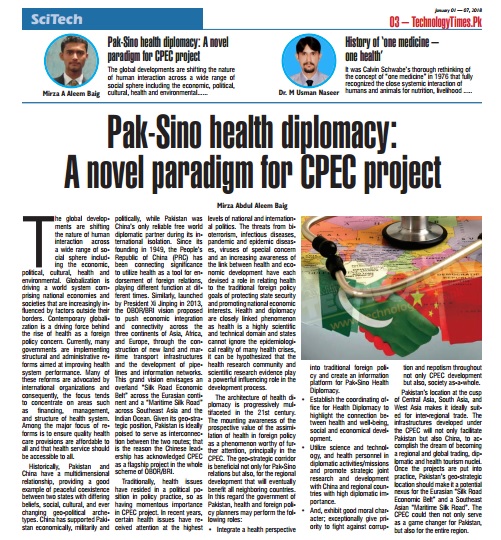The global developments
are shifting the nature of human interaction across a wide range of social
sphere including the economic, political, cultural, health and environmental.
Globalization is driving a world system comprising national economies and
societies that are increasingly influenced by factors outside their borders.
Contemporary globalization is a driving force behind the rise of health as a
foreign policy concern. Currently, many governments are implementing structural
and administrative reforms aimed at improving health system performance. Many
of these reforms are advocated by international organizations and consequently,
the focus tends to concentrate on areas such as financing, management, and
structure of health system. Among the major focus of reforms is to ensure
quality health care provisions are affordable to all and that health service
should be accessible to all.
Historically, Pakistan
and China have a multidimensional relationship, providing a good example of
peaceful coexistence between two states with differing beliefs, social,
cultural, and ever changing geo-political archetypes. China has supported
Pakistan economically, militarily and politically, while Pakistan was China’s
only reliable free world diplomatic partner during its international isolation.
Since its founding in 1949, the People’s Republic of China (PRC) has been connecting
significance to utilize health as a tool for endorsement of foreign relations,
playing different function at different times. Similarly, launched by President
Xi Jinping in 2013, the OBOR/BRI vision proposed to push economic integration
and connectivity across the three continents of Asia, Africa, and Europe,
through the construction of new land and maritime transport infrastructures and
the development of pipelines and information networks. This grand vision
envisages an overland “Silk Road Economic Belt” across the Eurasian continent
and a “Maritime Silk Road” across Southeast Asia and the Indian Ocean. Given
its geo-strategic position, Pakistan is ideally poised to serve as
interconnection between the two routes; that is the reason the Chinese
leadership has acknowledged CPEC as a flagship project in the whole scheme of
OBOR/BRI.
Traditionally, health
issues have resided in a political position in policy practice, so as having
momentous importance in CPEC project. In recent years, certain health issues
have received attention at the highest levels of national and international
politics. The threats from bioterrorism, infectious diseases, pandemic and
epidemic diseases, viruses of special concern and an increasing awareness of
the link between health and economic development have each devised a role in relating
health to the traditional foreign policy goals of protecting state security and
promoting national economic interests. Health and diplomacy are closely linked
phenomenon as health is a highly scientific and technical domain and states
cannot ignore the epidemiological reality of many health crises, it can be
hypothesized that the health research community and scientific research
evidence play a powerful influencing role in the development process.
The architecture of
health diplomacy is progressively multifaceted in the 21st century. The
mounting awareness of the prospective value of the assimilation of health in
foreign policy as a phenomenon worthy of further attention, principally in the CPEC.
The geo-strategic corridor is beneficial not only for Pak-Sino relations but
also, for the regional development that will eventually benefit all neighboring
countries. In this regard the government of Pakistan, health and foreign policy
planners may perform the following roles:
·
Integrate a health perspective into traditional
foreign policy and create an information platform for Pak-Sino Health
Diplomacy.
·
Establish the coordinating office for
Health Diplomacy to highlight the connection between health and well-being,
social and economical development.
·
Utilize science and technology, and
health personnel in diplomatic activities/missions and promote strategic joint
research and development with China and regional countries with high diplomatic
importance.
·
And, exhibit good moral character;
exceptionally give priority to fight against corruption and nepotism throughout
not only CPEC development but also, society as-a-whole.
Pakistan’s location at
the cusp of Central Asia, South Asia, and West Asia makes it ideally suited for
inter-regional trade. The infrastructures developed under the CPEC will not
only facilitate Pakistan but also China, to accomplish the dream of becoming a
regional and global trading, diplomatic and health tourism nuclei. Once the
projects are put into practice, Pakistan’s geo-strategic location should make
it a potential nexus for the Eurasian “Silk Road Economic Belt” and a Southeast
Asian “Maritime Silk Road”. The CPEC could then not only serve as a game
changer for China and Pakistan, but also for the entire region.



No comments:
Post a Comment